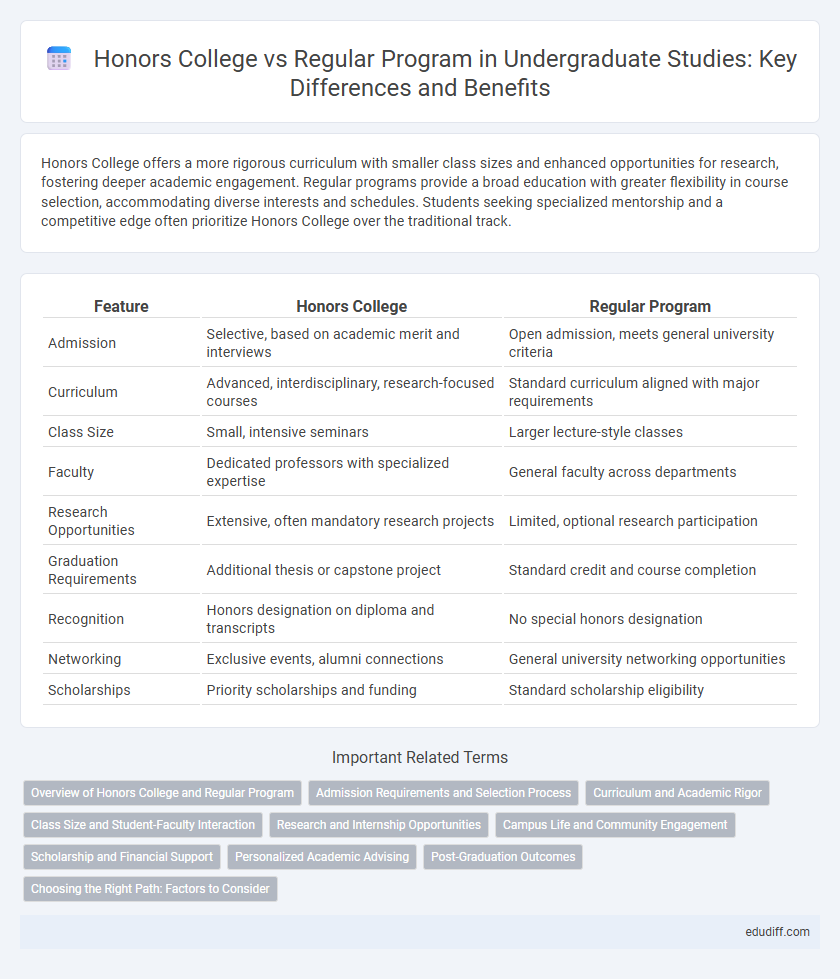Honors College offers a more rigorous curriculum with smaller class sizes and enhanced opportunities for research, fostering deeper academic engagement. Regular programs provide a broad education with greater flexibility in course selection, accommodating diverse interests and schedules. Students seeking specialized mentorship and a competitive edge often prioritize Honors College over the traditional track.
Table of Comparison
| Feature | Honors College | Regular Program |
|---|---|---|
| Admission | Selective, based on academic merit and interviews | Open admission, meets general university criteria |
| Curriculum | Advanced, interdisciplinary, research-focused courses | Standard curriculum aligned with major requirements |
| Class Size | Small, intensive seminars | Larger lecture-style classes |
| Faculty | Dedicated professors with specialized expertise | General faculty across departments |
| Research Opportunities | Extensive, often mandatory research projects | Limited, optional research participation |
| Graduation Requirements | Additional thesis or capstone project | Standard credit and course completion |
| Recognition | Honors designation on diploma and transcripts | No special honors designation |
| Networking | Exclusive events, alumni connections | General university networking opportunities |
| Scholarships | Priority scholarships and funding | Standard scholarship eligibility |
Overview of Honors College and Regular Program
The Honors College offers a rigorous academic curriculum designed for high-achieving undergraduates, emphasizing small class sizes, specialized research opportunities, and close faculty mentorship. In contrast, the Regular Program provides a broader range of courses with standard class sizes, focusing on a comprehensive undergraduate education without the intensified research or individualized attention. Students in the Honors College often benefit from enhanced resources, priority registration, and exclusive extracurricular activities tailored to advanced learning and intellectual growth.
Admission Requirements and Selection Process
Honors College admission typically requires a higher GPA, standardized test scores, and a detailed application including essays and recommendations compared to the Regular Program. The selection process for Honors College is more competitive, often involving interviews and holistic review to assess leadership potential and academic excellence. In contrast, the Regular Program generally admits students based primarily on meeting minimum academic criteria without the additional evaluative components.
Curriculum and Academic Rigor
Honors College programs feature an enriched curriculum with specialized courses, smaller class sizes, and opportunities for interdisciplinary research, fostering deeper critical thinking and academic engagement. Regular programs follow a standardized curriculum designed to cover fundamental knowledge and skills within the discipline, typically with larger class sizes and less emphasis on advanced seminars. Academic rigor in Honors College demands higher performance standards, frequent evaluations, and often includes capstone projects or thesis requirements, contrasting with the more generalized assessments in Regular programs.
Class Size and Student-Faculty Interaction
Honors College classes typically have smaller sizes, often ranging from 15 to 25 students, which fosters more personalized and engaging student-faculty interactions compared to regular program classes that can exceed 100 students. This intimate setting in Honors Colleges enhances academic support, collaborative learning, and mentorship opportunities. Regular programs, while larger, offer diverse peer interactions but may limit individualized attention from faculty.
Research and Internship Opportunities
Honors College students benefit from exclusive research opportunities through specialized faculty mentorship and access to advanced laboratories, fostering deeper academic engagement. Internship placements within competitive industries are prioritized for Honors students via dedicated career services and alumni networks, enhancing professional development. Regular program students have access to research and internships, but opportunities may be less personalized and intense compared to those offered by the Honors College.
Campus Life and Community Engagement
Honors College students experience a tightly-knit community with exclusive access to specialized campus events, leadership opportunities, and collaborative research projects that foster deeper engagement. Regular program students benefit from a broader social environment with diverse clubs and activities, offering flexibility but less targeted academic networking. Both pathways encourage community service and campus involvement, though the Honors College prioritizes high-impact, interdisciplinary initiatives promoting academic excellence and civic responsibility.
Scholarship and Financial Support
Honors College programs typically offer specialized scholarships and enhanced financial support packages compared to regular undergraduate programs, targeting high-achieving students with merit-based awards. These scholarships often include full or partial tuition waivers, stipends for research, and priority access to grants and funding opportunities. Regular programs generally provide need-based financial aid but have fewer exclusive scholarships dedicated to academic excellence and enrichment.
Personalized Academic Advising
Honors College students benefit from personalized academic advising that offers tailored guidance to align with their advanced coursework and research interests, contrasting with the more standardized advising in regular programs. This specialized support enhances academic planning and access to exclusive opportunities such as honors seminars and mentorships. Personalized advising in Honors College fosters deeper faculty engagement, promoting a customized educational experience geared toward academic excellence and career readiness.
Post-Graduation Outcomes
Graduates from Honors Colleges typically experience higher employment rates and greater acceptance into prestigious graduate programs compared to Regular Program alumni. These students benefit from enhanced networking opportunities, rigorous academic training, and access to exclusive internships, which contribute to stronger post-graduation career prospects. Studies show that Honors College graduates often report higher starting salaries and job satisfaction within competitive fields.
Choosing the Right Path: Factors to Consider
Choosing between an Honors College and a Regular Program involves evaluating academic rigor, personalized learning opportunities, and resource access. Honors Colleges often provide smaller class sizes, specialized seminars, and enhanced research opportunities, which can enrich a student's educational experience. Consider personal learning style, career goals, and the availability of support services to determine the best fit for maximizing undergraduate success.
Honors College vs Regular Program Infographic

 edudiff.com
edudiff.com